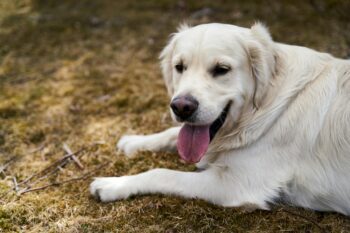Golden Retrievers, often called the ultimate family dogs, are known for their friendly personalities, beautiful golden coats, and endless enthusiasm for life. These dogs are the quintessential “good boys” and “good girls,” always ready for a game of fetch or a swim in the lake. Golden Retrievers are famous for their gentle and loving nature, making them perfect companions for families, singles, and seniors. They are also highly intelligent and eager to please, making training a breeze. However, even these boundless bundles of joy eventually reach their senior years. Typically, a Golden Retriever is considered a 7 to 8-year-old senior, though some may show signs of aging earlier or later depending on their health and lifestyle. Golden Retrievers might slow down a bit as they age, trading their endless play sessions for more naps, but they never lose their warm-hearted spirit. Let’s explore the different stages of a Golden Retriever’s life and see how these lovable dogs age with grace, humor, and a lot of tail wagging.
1. The Puppy Phase: Fluffy Balls of Joy
They are adorable bundles of energy, curiosity, and fluff in the first year of a Golden Retriever’s life. Golden Retriever puppies are known for their playful and sometimes goofy nature, often tumbling over their own feet in their eagerness to explore the world. They love to chew on anything they can get their paws on, and their enthusiasm for playtime seems endless. This phase is characterized by lots of play, cuddles, and a whole lot of learning. Golden Retrievers quickly form strong bonds with their families and are eager to please them, making them highly trainable. Despite their boundless energy, they are incredibly affectionate and love nothing more than being close to their humans.
2. The Adolescent Years: The Teenager with Boundless Energy
Golden Retrievers enter their adolescent phase from around 1 to 2 years old. This stage can be like the teenage years for humans—full of energy, curiosity, and occasional mischief. Adolescent Goldens are still playful and eager to explore but may also start testing boundaries and pushing limits. They might be more independent during this phase and can be a bit stubborn, making consistent training and positive reinforcement important. Despite the challenges, this is also a time of great bonding as their personalities fully develop. They remain affectionate and loyal, often seeking out their favorite humans for play and cuddles. Their high energy levels make them excellent companions for active families.
3. The Prime Years: Energetic and Enthusiastic Companions
Between 2 and 7 years old, Golden Retrievers are in their prime. These years are marked by a perfect balance of energy and maturity. Goldens in their prime are active, enthusiastic, and eager to participate in various activities, from hiking and swimming to agility and obedience training. They are also highly social and enjoy spending time with their human and canine families. This is the time when their love for life and people is at its peak, and they often take on the role of family clowns with their playful antics. Golden Retrievers in their prime are also known for their gentle nature and are excellent with children and other pets. Their loyalty and affection make them beloved members of the family.
4. The Middle Ages: A Slight Slowdown
Golden Retrievers start entering their middle-aged years around 7 to 8 years old. During this time, they may begin to slow down a bit, preferring more moderate activities over the vigorous exercise they once loved. This phase often brings a more relaxed and mellow attitude, although they enjoy playtime and outdoor adventures. Goldens may start to show signs of aging, such as graying fur around the muzzle and a softer, more dignified appearance. Despite these changes, they remain active and engaged, enjoying the company of their human and animal companions. Regular veterinary check-ups and a balanced diet are important to maintain their health and well-being during these years.
5. The Senior Years: Gentle and Wise
Golden Retrievers are generally considered seniors when they reach 7 to 8 years old. This phase is marked by a noticeable reduction in energy levels and a greater appreciation for relaxation and comfort. Senior Goldens may develop age-related health issues such as arthritis, hip dysplasia, or vision and hearing loss, which can affect their mobility and overall well-being. However, their loving and gentle nature often remains unchanged, and they continue to bring joy to their families. They may enjoy gentler activities, like short walks and leisurely play, and cherish their time with their loved ones. Senior Golden Retrievers often develop a wise and calm demeanor, and their bond with their human companions deepens. They continue to be loving, loyal companions, offering comfort and joy even in their golden years.
With their friendly personalities and boundless love, Golden Retrievers bring joy at every stage of life. From the playful puppy phase to the gentle senior years, these dogs are full of warmth, humor, and affection. While they may slow down as they age, their love for their families and cheerful spirit never fade. Each stage offers unique experiences and memories, making life with a Golden Retriever a heartwarming and delightful journey. Whether they’re bounding through the fields or snuggling up for a cozy nap, Golden Retrievers have a special way of bringing happiness and comfort into our lives. So, cherish every moment with your Golden Retriever, and enjoy the endless love and joy they bring into your home, from their fluffy puppy days to their wise old age.
Frequently Asked Questions Someone Might Have About Their Aging Golden Retriever
The post When Does a Golden Retriever Reach Old Age? appeared first on iHeartDogs.com.

